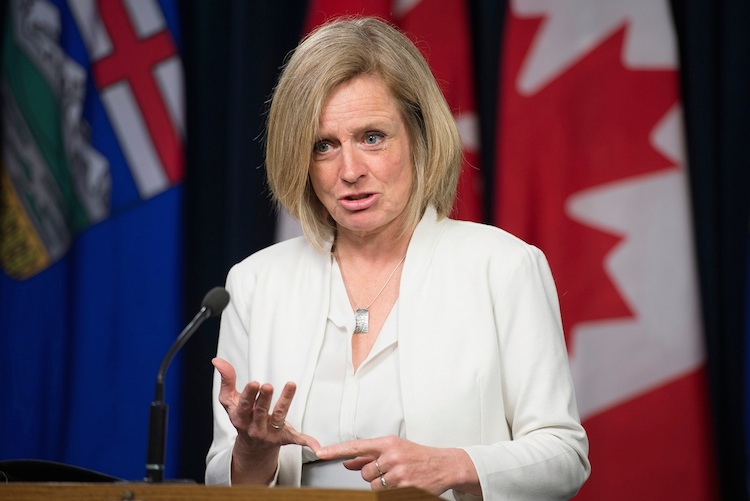Using language that, intentionally or not, evoked the Peter Lougheed Era of Tory energy policy confrontation with other jurisdictions, NDP Premier Rachel Notley yesterday warned British Columbia’s next government — whatever it turns out to be once the ballot recounting over the Rockies is finally done — not to dare trying to stop expansion of Kinder Morgan’s Trans Mountain Pipeline to B.C.’s southwest coast.
“I fundamentally disagree with the view that one province or even one region can hold hostage the economy of another province,” Premier Notley said bluntly at a news conference in Edmonton called to announce Alberta has been granted intervenor status in the 16 legal challenges next October to the expansion of the line, which is deeply unpopular in B.C.
Anyway, she told reporters, the Trans Mountain Pipeline has been approved in the national interest by the Liberal government of Prime Minister Justin Trudeau in Ottawa, and thus there is not much B.C. politicians can do to stop it.
In saying these things the forceful way she did, Premier Notley hit the tone most Albertans expect of their premier in a situation like this. Indeed, this seems to be one of those moments, quite rare of late, in which Alberta New Democrats and the province’s still-disunited conservatives are all singing from the same hymnbook.
But you could also argue that B.C. Premier Christy Clark, NDP Leader John Horgan and Green Party Leader Andrew Weaver — all of whose parties will have seats in the B.C. Legislature, whether Clark or Horgan gets to be the premier when the dust from last week’s election has finally settled — are also all trying to meet the expectations of B.C. voters, who seem to feel no province should have the right to hold hostage the environment of another, or the planet.
And there’s plenty the government of a jurisdiction through which a pipeline like Kinder Morgan’s must pass could do to slow a project in hopes the economic justification for the controversial expansion would cool the ardour of investors before much work was done.
As a general principle, of course, Notley is right. No federation — be it a dominion like ours or a republic like the one next door — can survive for long if the economic interests of one region overwhelm those of others.
She argues for the economic benefits of the pipeline thusly:
“New pipelines mean a brighter future for our oil and gas industry, with jobs and opportunities for tens of thousands of working families and billions of dollars in new investment. We believe that a strong economy and a clean environment go hand-in-hand. We’ll continue to show this by fighting for Alberta’s interests in court to get oil flowing to new markets and a better return for Albertans on every barrel.”
But the sixty-four billion dollar question, as it were, is whether in current circumstances the Kinder Morgan pipeline expansion actually still makes sense, never mind the widespread Albertan belief in the economic benefits pipelines deliver. Because, despite the near universal faith in Alberta that getting our oilsands bitumen to “tidewater” will result in it fetching a higher price, the evidence for this belief is disputed.
For example, earth scientist David Hughes told the Canadian Centre for Policy Alternatives Corporate Mapping Project conference in Victoria last week that the vaunted tidewater and Asian market price premiums are largely mythical.
With overcapacity in refining facilities on the U.S. Gulf Coast, and the Keystone XL Pipeline approved by the Trump Administration, he argued, reduced transportation costs mean the price advantage for Alberta bitumen actually belongs to Texas.
“There is no ‘Asia premium’ as alleged by the Alberta and federal governments,” Hughes stated. “Exports to Asia could lose $2 to $4.80 US per barrel compared to U.S. exports based on transport tolls.”
Furthermore, he argued, “the tidewater price premium that existed in 2011 to 2015 has been eliminated due to the elimination of pipeline bottlenecks.”
So even without agreements to reduce carbon emissions to slow climate change, this undermines the economic justification for more pipelines. “With the existing emissions cap there’s enough pipeline capacity to meet any production scenario,” Hughes asserted. “Trans Mountain and Energy East are complete overkill. They’re not needed at all.”
Naturally, we can expect the Alberta and federal governments to argue differently, but the existence of such analyses will not make the political problem in British Columbia go away.
Also yesterday, Notley assailed the idea, floated by an expert panel obviously sympathetic to the inclinations of the Ottawa mandarinate, that it makes sense to move the headquarters of the National Energy Board back to the nation’s capital.
“If someone were to propose that you move the Atlantic Opportunities Marketing Agency from Atlantic Canada to Winnipeg, people would say that’s dumb,” the premier said. “Let me just say, moving the NEB to Eastern Canada is dumb. We are absolutely opposed to that and it shouldn’t happen.”
Image: Chris Schwarz, Government of Alberta
This post also appears on David Climenhaga’s blog, AlbertaPolitics.ca.
Like this article? Please chip in to keep stories like these coming.





